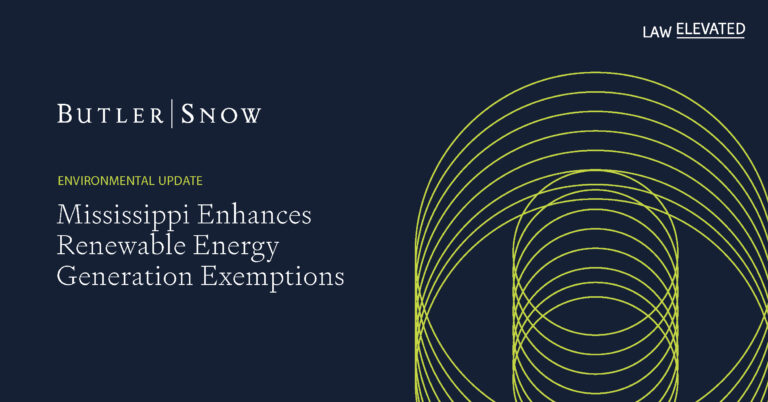In recent years, there has been considerable interest in renewable energy, spurred by a desire of large industrial users to be 100% renewable, governmental policy and other factors. As a result, there has been an increased interest in developing facilities to generate renewable energy across the country. In the Southeast, most are solar projects. Solar facilities typically involve an investment of $100 million or more and, if successfully developed, will become significant, long-term taxpayers which require virtually no governmental services. Many counties have viewed renewable energy projects as an economic development opportunity and typically offer property tax incentives to recruit these projects. This is also a highly competitive business, as utilities and other purchasers of renewable energy seek to contract for the lowest cost power and developers seek to minimize their project costs. As a result, in recent years, the Mississippi legislature has expanded the property tax incentives available to local governing authorities to use as recruitment tools.
Traditionally, Mississippi’s fee-in-lieu (FIL) statute, Miss. Code Ann. Section 27-31-104, offered the most flexible and significant property tax incentive. When that statute was originally passed in 1989, it provided for an abatement up to 2/3 of the otherwise payable annual property tax, required a capital investment of $100 million and was for maximum term of 10 years. Over the years, the FIL statute has been amended several times, but each amendment prior to 2022 preserved the maximum 2/3 abatement. These amendments did reduce the minimum investment to $60 million and increased the permitted contractual term to 30 years, with the proviso that no tract of land or piece of property could be exempt for more than 10 years (the net effect being to permit project additions and replacement equipment to be exempted during the 30 year term without having additional action by the granting authority). The FIL has always been an abatement which is granted by the local governing authorities (county and city if within city limits) although it must be certified by the MS Development Authority (MDA). The FIL abates school taxes as well as county/city taxes, but school districts must receive at least their pro rata share of the annual FIL payment.
As other states have enacted larger exemptions for solar projects, Mississippi’s available incentives have also increased. In 2021, the Mississippi legislature passed Miss. Code Ann. Section 27-31-46. It applied to projects generating energy through the use of a renewable energy source such as wind, water, biomass or solar. The statute authorizes a county board of supervisors to grant a tax exemption up to 50% of the assessed value of renewable energy projects having a minimum capital investment of $100 million. The legislative process for this statute was convoluted and, once the final language was adopted, it was not at all clear whether this exemption was in addition to the FIL exemption or was an alternative thereto. To clarify this uncertainty, an Attorney General’s Opinion was requested, which concluded that the 50% exemption could be granted in addition to the FIL. MS Op. Att’y Gen. No. 2021-00164 (Perry, Jan 14, 2022). Consequently, with County approval, a renewable energy project developer could get both, the result being that there could be an exemption of up to 5/6 (50% in addition to ⅔).
In the 2022 legislative session, another amendment to the FIL statute was passed, allowing the FIL exemption for renewable energy projects defined under 27-31-46 to be up to 90% instead of 2/3. That amendment became effective on July 1, 2022. Based on the Attorney General Opinion described above, the larger FIL abatement could be granted in addition to the 50% renewable energy exemption.
The recent statutory changes provide local governing authorities significant additional tools as they seek to recruit renewable energy projects in this highly competitive industry. As with many economic development incentives, the amount and scope of the incentive is a matter to be negotiated between the developer and local authorities.
